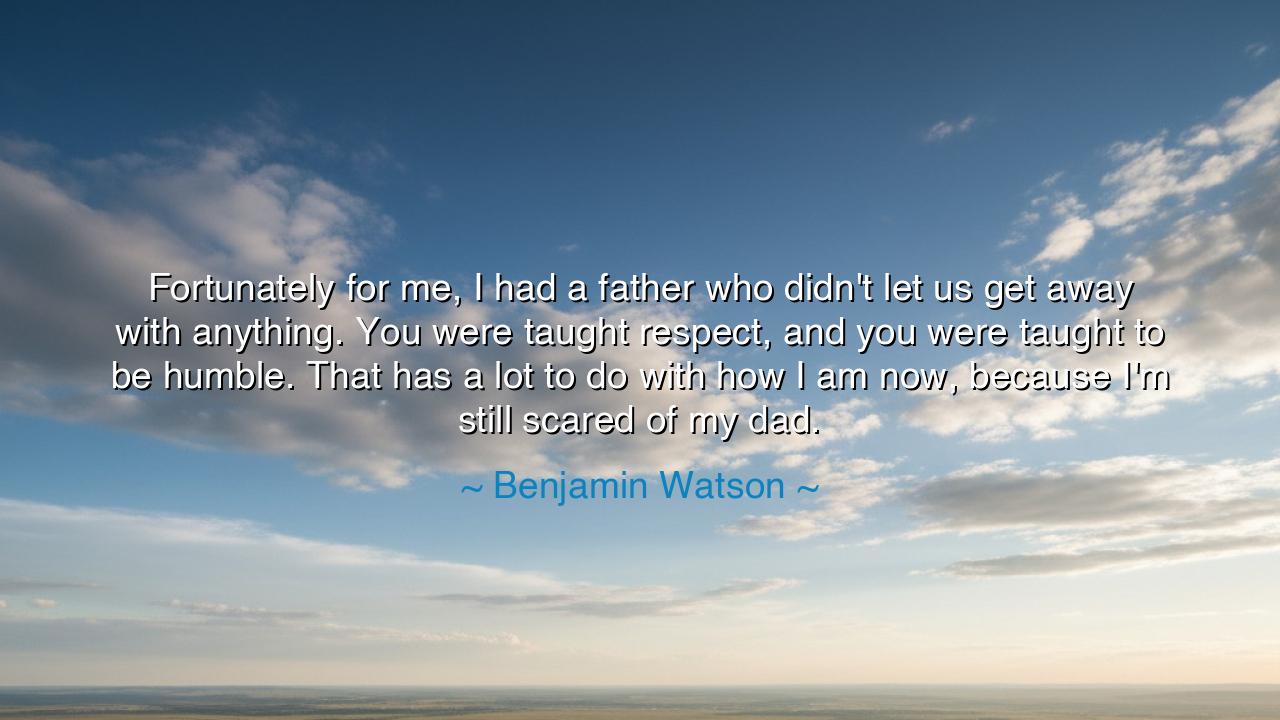
Fortunately for me, I had a father who didn't let us get away
Fortunately for me, I had a father who didn't let us get away with anything. You were taught respect, and you were taught to be humble. That has a lot to do with how I am now, because I'm still scared of my dad.






“Fortunately for me, I had a father who didn't let us get away with anything. You were taught respect, and you were taught to be humble. That has a lot to do with how I am now, because I'm still scared of my dad.” — Benjamin Watson
Thus spoke Benjamin Watson, a man forged in discipline and guided by reverence — not only for his father, but for the principles that shaped his soul. Beneath his words lies the timeless power of respect, the kind that does not come from fear alone, but from honor, from a deep acknowledgment of authority and love intertwined. In this statement, Watson pays tribute to the stern, steady hand that corrected him, the voice that demanded accountability, and the heart that taught him that greatness is never born from comfort.
The origin of this quote rests in the story of Watson’s upbringing, the kind that produced not just an athlete of strength, but a man of character. As a professional football player and public figure, Watson often reflected on the moral foundations laid by his father — lessons learned not in stadiums, but in the home. His father’s refusal to let him “get away with anything” was not cruelty, but discipline — the kind that shapes children into adults who can stand firm when the world tests them. From his father, he learned that respect is not a demand, but a duty; humility, not weakness, but wisdom.
In every age, such fathers have existed — men who understand that love, to be true, must also be firm. Their children may “fear” them, as Watson confesses, but it is not the fear of harm — it is the reverence of conscience. It is the knowledge that their father’s eyes, whether near or far, still watch the path of their lives, guiding them toward integrity. The ancient Greeks called this aidōs — a sacred fear, born from respect for what is right and shame for what is wrong. Such fear is not a chain but a compass; it keeps one from straying into arrogance or folly.
Consider Marcus Aurelius, the philosopher-king of Rome, who wrote in his Meditations of his own father’s influence: “From my father, I learned to be mild and manly, to avoid evil, to give willingly, to stand firm.” Like Watson, Aurelius revered his father not because he was lenient, but because he was just. His father’s discipline did not suppress him — it built him. This is the paradox of strong parenting: that strictness, tempered by love, becomes the forge of greatness. Those who are never corrected grow soft; those who are shaped by firmness grow rooted in virtue.
Watson’s confession that he is “still scared” of his father, even as a grown man, carries deep meaning. It reveals the endurance of moral authority — that the lessons of youth do not fade when childhood ends. Such fear transforms, over time, into self-discipline. The father’s voice becomes the son’s conscience; the rules once enforced from without now arise from within. In this, Watson’s fear is sacred — it is not about punishment, but about disappointing the legacy of a man who demanded integrity. The truest kind of fear, then, is not of a father’s wrath, but of failing to live up to his love.
This truth reaches far beyond one family. It speaks to a generation that too often mistakes freedom for the absence of boundaries. Watson reminds us that respect and humility are the pillars upon which character stands. A child who learns to bow before authority learns, too, how to rule himself. The proud man who has never knelt in discipline cannot stand tall in virtue. To fear one’s father rightly is to carry within oneself a lifelong awareness of accountability — to know that one’s actions echo beyond the self, into family, legacy, and history.
Let this, then, be the lesson: welcome correction, for it is a sign of love. Honor those who hold you to higher standards, for they see in you what you might yet become. And when you become the teacher, the leader, or the parent, do not shrink from guiding others with strength — but let that strength be grounded in love. The world does not need more indulgence; it needs more fathers and mothers who, like Watson’s, demand truth, humility, and respect.
So, my child of the future, remember these words: discipline is the armor of the soul. The fear you feel before the wise is not weakness, but wisdom itself. Be grateful for those who taught you to stand straight, to speak honestly, to bow before virtue. For one day, others will look upon you — and your strength, your integrity, your humility — and they will know, as Benjamin Watson did, that behind it all stands the silent greatness of a parent who would not let you “get away with anything.”






AAdministratorAdministrator
Welcome, honored guests. Please leave a comment, we will respond soon